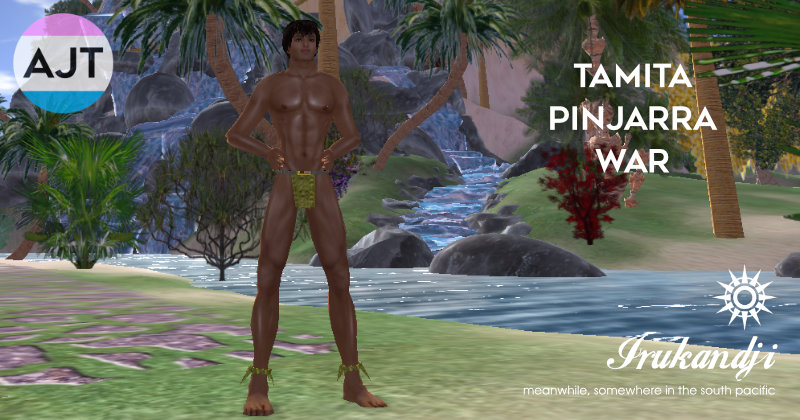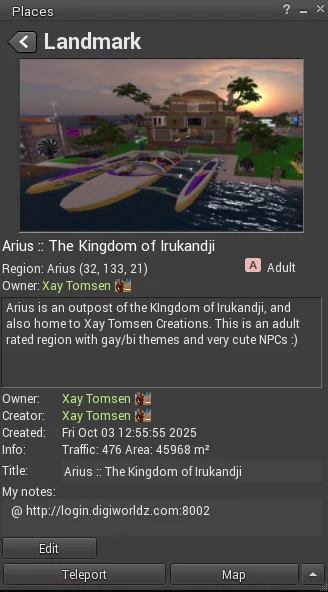In 1975, after more than a century of British rule, the small South Pacific nation of Irukandji gained independence.
Still tribal in nature, but accustomed to the British system of government, the elders decided to establish their new country as a kingdom, with an advisory council comprised of the elder of each tribe.
The reign of King Daniel
The person chosen to be King would hold the throne for fifty years, and if he died, his tribal heir would take over. At the end of his clan's allotted time, the elders would meet again to decide their new King.
Given his diplomatic and wise disposition, coupled with his tribe's traditional distaste for conflict, Daniel de Weta, elder of the Weta tribe in Irukandji's northeast, was named King.
With much of the colonial infrastructure still in place; its buildings, utilities, and procedures, the transition to nationhood went smoothly. New connections were made with other nations, which in the absence of European interference, were happy to take advantage of mutual trade with the new kingdom.
For four years, prosperity prevailed, until suddenly without warning, King Daniel died, his death attributed to a weakened heart.
While sad, that contingency was allowed for. Under the terms of his ascension, his next-in-line would take the throne. What had not been considered however, was betrayal. Within days of Daniel's passing, a despicable coup began.
All eight of his children went to the private sanctuary on Weta Rim to grieve. It was a chance to heal and for the heir to find her feet. But before the process could begin, mercenaries rowed ashore with machetes and swords. Unprepared and defenceless, all of Daniel's children were slain.
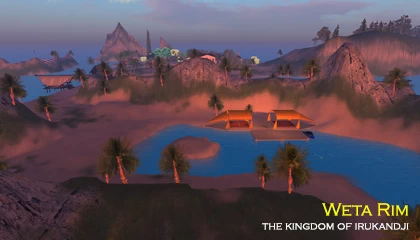
A very long game
While the advisory council tried frantically to identify the perpetrators, one elder amongst them - aware that his warriors were about to be uncovered as the assassins of Daniel and his kin - subtly vacated his post. The Pinjarran prince, Kebo Kebo.
Kebo was a scarred man psychologically. Pinjarra Island's history was not a pleasant one, and the angry rants of his grandfather, the mighty Pinjarra himself, had taken their toll. Now in his sixties and with a lifetime of hatred poisoning his mind, Kebo finally played his hand.
With a hundred paid mercenaries, Fijian ex-military, and the strength of his own army of warriors, he divided and conquered. Half of his force charged north to the naval base at Split Rock Mountain, capturing it with ease. The other half raced southeast to Old Fort Island and over-ran the army base.
From each conquered outpost, they fanned out, encircling the islands and cutting off help from the outside world. Kebo made his demands to the Council clear. The Irukandji experiment was over. Submit to Pinjarran rule, or die.
Kebo's confidence and arrogance were absolute as his forces over-ran the outlying states. Aboyo and Manatu were the first to fall, their people rounded up and put into camps.
The Council knew his final prize was Tamita Island, former colonial capital and largest city in Irukandji. It controlled the nation's infrastructure and wealth. If Kebo conquered Tamita, all of Irukandji would fall.
And that possibility was real. Tamita Island had few defences. A lone cannon sat perched atop the mountain which had not been fired since World War II, and a small civilian police force patrolled the seas. In fact, all of Tamita's strength lay in its people, the fabled Tamita warriors.
Meanwhile in the north, Weta, leaderless in the wake of the royal family's assassination, suffered the same fate. Only one of Daniel's kin survived, his pregnant sister, Jalna. Only morning sickness had prevented her becoming victim to the Weta Rim massacre.
However, in the wake of those horrors, Princess Jalna was overwhelmed to the brink of insanity. She couldn't function. Her husband whisked her away in the night, turning to the only ally he knew could be trusted beyond doubt - Savu de Tamita, chief of the Tamita tribes.
Beloved in their youth, and most likely every since, Daniel and Savu shared a bond that was long and pure, born of love and lust and war.
The battle-weary warrior
Prince Savu de Tamita was an understated man.
Like Kebo and Daniel, he had sat as an infant at the feet of Uba Uba, the great revolutionary queen, hanging on her every word. Then years later as an adult, again like his friends, he had fought against the British for Irukandji's independence.
Now in middle-age and with independence gained, Savu wanted the second half of his life to be peaceful. He meditated often. Nowadays he was calmness personified.
Quiet at council meetings, he listened in silence unless he had something constructive to say. His self-control, along with his heroic past, made Savu's voice loud amongst his peers. Indeed, it was Savu's careful and considered arguments that saw Daniel crowned king.
Savu was the same when out amongst the people of his tribe. Justice was dispensed thoughtfully and quietly. His word was final and never appealed. To his people, his solemnity and gravitas made him a god, which most truly believed him to be.
So it was, that when Daniel died - his childhood friend, the love of his life - he wept. Savu wept hard. In dignity and in a private corner of the palace, he spent two nights alone with his sorrow.
But then, when news arrived of the massacre of Daniel's children, he stopped. Abruptly. He felt it. Fire. His insides were tearing apart. Yet somehow he maintained his outer calm. But then came the threat. It seemed like an eternity but in truth it was just a day.
"Submit or die."
Kebo had killed his friend, and then his friend's children, and now threatened the kingdom he and Daniel had fought so hard to free from tyranny - just to have another tyrant take control.
Without warning or hope to deny it, Savu's teenage self took hold, and the blood of his warrior ancestors boiled over.
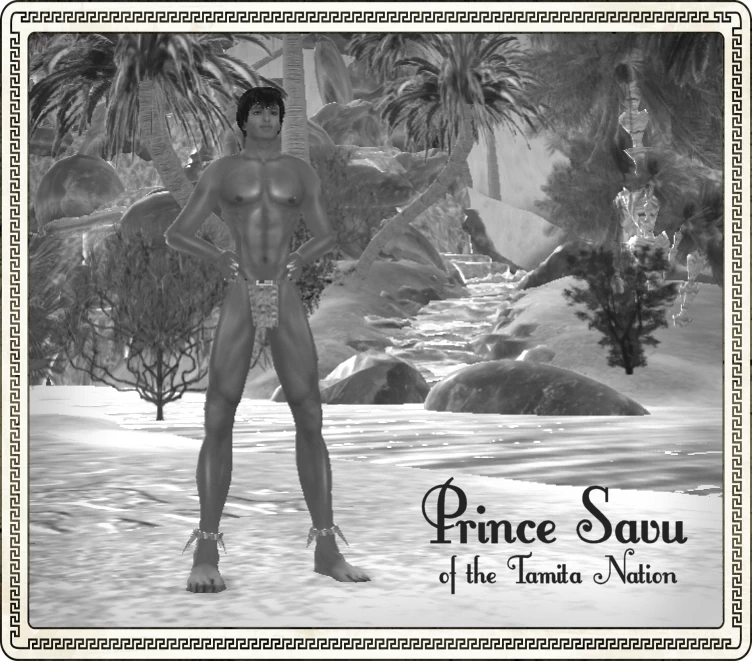
Storm upon the sea
Barefoot and naked, Savu ran out of the palace and screamed his rage to the sky. For his peers, it forced a memory, a call to arms, his battle scream the thing of myth and legend. For others, it sent a chill to the core of their souls.
With spear on his back and shield on his arm - like Hiahungi come to life - he climbed the slope of Tamita Peak, his hand on the ancient cannon, and stared down at the gathering throng.
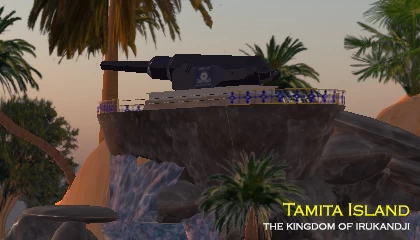
Thousands of faces stared up at him. The sight of their noble chief, angry and stripped and eager for war, made the entire island fall still. Such was the silence that a seagull could be heard a mile offshore.
When finally Savu spoke, his voice was calm and deep as thunder. He called upon the people of Irukandji, native and white, men and women, young and old, to fight at his side. And they did.
Two months of bloody war followed, as island by island, Savu's forces, armed only with weapons of old, pressed on. Finally, they freed all the outlying states, his army growing larger with each victory. And then he set his sights on Pinjarra itself.
His raging army crossed the sea like a storm. The locals threw down their arms and ran. But still Savu raged. Finally, he had Kebo cornered in a villa on the atoll he had named for himself, Kebo Atoa.
Now panicked, Kebo begged for mercy, citing their kinship of old. Savu speared him then dragged him out onto the beach. Deaf to the traitor's pleas, remembering only the fate of poor Daniel's children, he gave into his rage and hacked Kebo to death with his blade.
What was left of Kebo's body, he threw to the sharks in the lagoon. His family was rounded up and put in chains, and his villa burnt to the ground.
The Tamita-Pinjarra War was over.
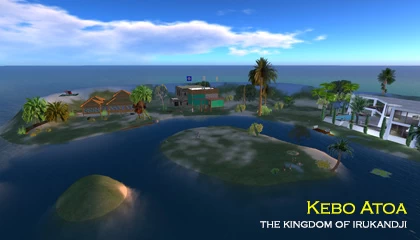
Kingdom without a king
In the days that followed, civilian order was restored. With his rage vented, Savu was himself again, his manner quiet and calm. Daniel's sister, Jalna, was in his care. She was near full term. Twins apparently. Her husband had died in the final battle for Weta, and now she was truly alone.
Her mind was all but gone now. It was clear she could not fill Daniel's role. Savu wondered how she would manage looking after the newborns - and the kingdom - when she couldn't take care of herself.
Regardless, the unborn infants were the sole remaining heirs to the Weta royal line. Savu knew they had to be protected at all cost. If need be, he would raise them as his own.
Such were his thoughts when he attended counsel with his fellow tribal elders to determine Irukandji's future. A week had passed since Kebo's death.
In his own eyes, he was the same man he had always been, but his peers regarded him with awe. The godly light in which his tribe perceived him now shone throughout the nation. Without voting or debate, the Aboyan chief handed him the crown. Savu regarded it briefly then shook his head.
"Irukandji has only one king," he said, "It is Daniel. I will serve as your prince of princes. Let us govern together, with kindness and wisdom, so our king may live forever."
And so it was that Irukandji became a kingdom without a living king.

Pinjarra must pay
Savu established the Princes of Irukandji, a council comprised of the elder and first-born of each of the Irukandji states. All but Pinjarra.
Kebo's progeny had yet to pay for their war crimes, not least of which was their direct involvement in the assassination of their fellow princes. It was decided that they would be punished under the tribal laws of old, in particular Pinjarran law.
Thus, all but Kebo's eldest son were killed by spear. The surviving heir was locked in chains and became a slave to the Crown.
It was further decreed that as penance for three generations, such would be the fate of each firstborn Pinjarran child. They would be allowed to breed a single heir in order to preserve their bloodline, but with the knowledge that said child would be nothing but a titled slave.
New generations
Time passed, and for the people of greater Irukandji, life returned to normal. Thirty years of prosperity followed. Savu saw the new century in then in 2009, passed away.
His royal house still had 20 years to reign before another tribe would take over. His own son, Aron, had died early before having the chance to ascend. Hence, Savu's grandson, Karu, succeeded him as Prince of Princes, a role he serves to the present day.
In Weta, one of Jalna's twin sons, Roth de Weta, serves as chief. Roth already has four children, two boys and two girls, ensuring the continuation of his royal line.
In 2013, Karu de Tamita charged a duty to Rah Pinjarra, the third Pinjarran heir born into slavery, to engineer and oversee the construction of the Trans Irukandji Causeway, a network of bridges and tidal roads to link all 75 of the kingdom's inhabited islands.
Rah saw to the task, completing it in five years, well ahead of expectations. As reward, and with approval of the Weta family, Karu granted Rah his freedom for outstanding public service to Irukandji.
In 2021, the Council of Princes invited Rah into their ranks, and the Pinjarra nation was re-admitted as a full member state of Irukandji.
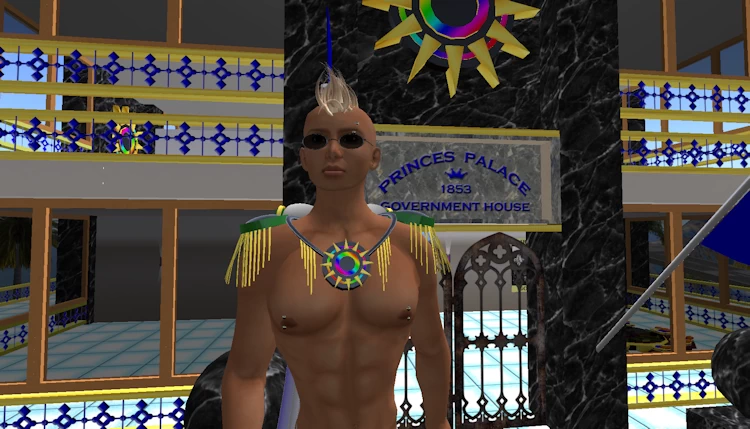
Teleport to present-day Irukandji
If you have a viewer for OpenSimulator installed, click the landmark to teleport to Arius.
♥ Andrew (Thommo) Thompson, a.k.a. Xay Tomsen

